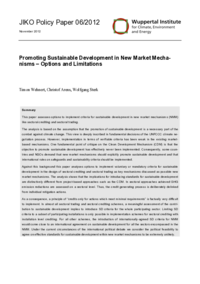
Several Parties (including the EU) as well as NGOs have demanded that new market mechanisms (NMM) should be designed in a way to explicitly support sustainable development (SD). Internationally agreed sets of rules could be established to safeguard environmental integrity, human rights and contributions to sustainable development in terms of environmental contributions (beyond GHG emission reductions) and social contributions (e.g. poverty reduction).
This paper assesses options to implement criteria for sustainable development in new market mechanisms like sectoral crediting and sectoral trading. The analysis shows that the implications for introducing standards for sustainable development are distinctively different from project-based approaches such as the CDM.
In sectoral approaches achieved GHG emission reductions are assessed on a sectoral level. Thus, the credit generating process is deliberately delinked from individual mitigation actions. As a consequence, a principle of “credits only for actions which meet minimal requirements” is factually very difficult to implement. In almost all sectoral trading and sectoral crediting schemes, a meaningful assessment of the contribution to sustainable development implies to introduce SD criteria for the whole participating sector. Limiting SD criteria to a subset of participating installations is only possible in implementation schemes for sectoral crediting with installation level crediting. For all other schemes, the introduction of internationally-agreed SD criteria for NMM would come close to an international agreement on sustainable development for all the sectors encompassed in the NMM.
Wehnert, T., Arens, C., Sterk, W.: Promoting Sustainable Development in New Market Mechanisms - Options and Limitations. JIKO Policy Paper 06/2012. Wuppertal Institute for Climate, Environment and Energy. Wuppertal - 34 pages, 3 figures, 4 tables.
Date:
November 2012
Cookie Settings
Marketing-Cookies werden von Drittanbietern oder Publishern verwendet, um personalisierte Werbung anzuzeigen. Sie tun dies, indem sie Besucher über Websites hinweg verfolgen.
Provider:
Statistik Cookies
Statistik-Cookies dienen der Analyse und helfen uns dabei zu verstehen, wie Besucher mit unserer Website interagieren, indem Informationen anonymisiert gesammelt werden. Auf Basis dieser Informationen können wir unsere Website für Sie weiter verbessern und optimieren.
Provider:
Erforderliche Cookies
Erforderliche Cookies sind für den reibungslosen Betrieb der Website zuständig, indem sie Kernfunktionalitäten ermöglichen, ohne die unsere Website nicht richtig funktioniert. Diese Cookies können nur über Ihre Browser-Einstellungen deaktiviert werden.
Provider: